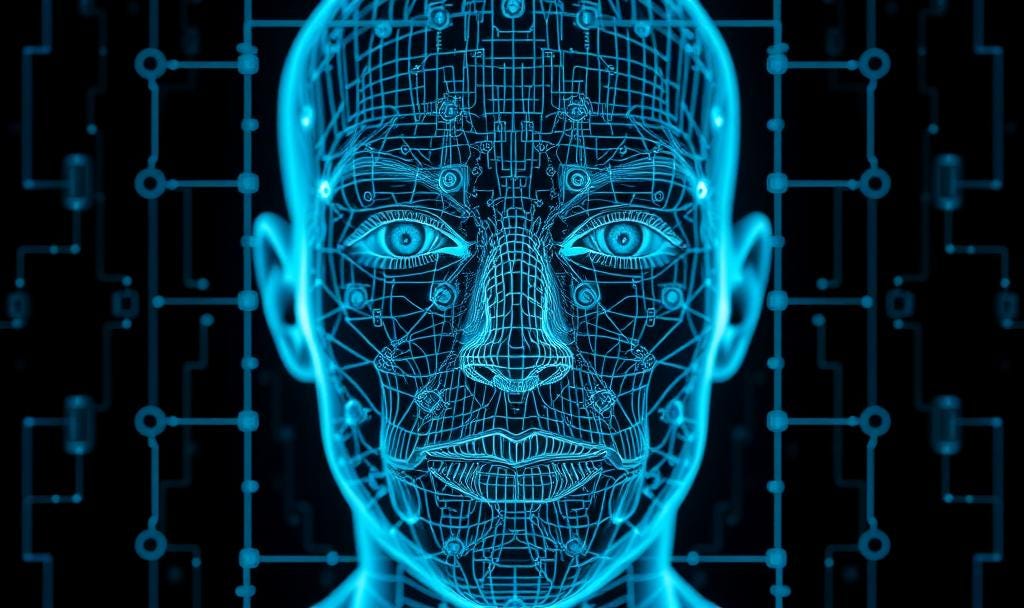Quantum Computing, AI as Lawyers, and Biometric Nightmares—Oh My! - privAIcy insights Newsletter #007
Your compass through the evolving maze of AI, privacy, and compliance. 🧭
👋 Hello! Today, we’re stepping into the future—no, scratch that, the present—where AI is taking law exams, quantum computing is making encryption nervous, and your face is now your password (whether you like it or not).
If you’ve been thinking, ‘What is this quantum computing stuff, and what are we gonna do with it?’ — you’re not alone. Let’s dive in!
🔮 The Future Is Coming: Quantum Computing’s Leap Forward
💡 ICYMI: Microsoft just announced a major breakthrough with its Majorana 1 chip—a step toward a truly scalable quantum computer.
But let’s cut through the hype. What does this actually mean for AI, cybersecurity, and the legal world?
⚡ Key Takeaways
🔓 Encryption at risk? Quantum computers could shatter current encryption standards in minutes, rendering today’s cybersecurity practices obsolete.
🧠 AI meets quantum: The fusion of quantum computing and AI could supercharge data processing, transforming everything from deep research to contract analysis overnight.
⚖️ Compliance chaos? Existing privacy laws (CCPA, GDPR, etc.) aren’t built for quantum threats—so what happens when quantum decryption makes today’s data security meaningless?
🤔 What Even Is Quantum Computing?
If you're wondering, "what in the world is quantum computing?"—think of it this way:
📚 A regular computer is like a librarian who can read one book at a time.
🔮 A quantum computer, however, is like a magical librarian who can read many books simultaneously, making calculations at speeds we’ve never seen before.
That’s the game-changer—but also the problem.
💥 The Security Nightmare: Quantum vs. Classical Encryption
Today’s encryption relies on the fact that factoring large numbers into primes is incredibly difficult for classical computers. This mathematical challenge is the backbone of modern cybersecurity.
Classic encryption: Secure because breaking it could take millions of years for today’s fastest computers.
Quantum decryption: A quantum computer could solve these problems in seconds, breaking encryption and exposing sensitive data.
The stakes? Financial transactions, government secrets, and your personal data—all suddenly vulnerable to a quantum-powered breach.
⚖️ Legal Implications
As quantum computing advances, new legal frameworks will undoubtedly emerge to address both risks and opportunities:
Compliance overhaul: Encryption laws will need urgent updates to protect data from quantum decryption.
Liability concerns: If quantum-powered AI makes high-stakes decisions, who bears responsibility for errors or failures?
Contracts & Security: Industries reliant on encryption-based security—like finance and healthcare—will need to rethink risk clauses in contracts.
The advancements in quantum computing hold immense promise—but also significant challenges. How we navigate this new frontier will shape the future of technology and law.
💭 Hypothetical
Imagine waking up one day and realizing that every encrypted database—financial records, legal contracts, classified data—was suddenly readable.
That’s the world quantum computing could create.
📧 Share this with someone who needs to be part of the conversation:
🤖 AI Lawyers: Hype vs. Reality
AI models aren’t replacing lawyers in the ways you think.
Case in point: Linklaters recently tested AI models on English law. The verdict? Impressive progress—but still no substitute for a sharp junior lawyer.
Even the best AI models still hallucinate, miss nuances, and require expert oversight.
What does this mean for legal AI adoption?
🔍 Where AI Shines vs. Where It Falls Short
✅ Legal research & first drafts—AI can process vast amounts of legal text in seconds, making it a powerful assistant for case law analysis and contract generation.
✅ Efficiency boosts—Firms already using AI report massive time savings on repetitive tasks like summarizing case law, due diligence, and document review.
❌ Full legal reasoning? Still human territory. AI lacks the strategic thinking, contextual judgment, and ethical reasoning required for complex legal matters.
Linklaters concluded that while AI tools are "starting to perform at a level where they could assist in legal research," they come with inherent dangers if used without human oversight—especially when lawyers "don’t already have a good idea of the answer."
💡 So, what’s next? Will AI’s role in law evolve faster than anticipated? Will clients demand AI-powered efficiency? I think the answer to both will be “yes” but it won’t mean AI will entirely replace human lawyers.
💭 What are your thoughts? Could AI replace more legal tasks than we expect?
😨 Your Face and Voice Are the New Passwords—And That’s a Problem
Big Tech wants you to trust AI-powered authentication. Hackers love that idea.
Deepfake technology is accelerating—multi-modal AI can now replicate voices, generate hyper-realistic deepfakes, and even analyze micro-expressions. The security industry sees biometric authentication (face scans, voice recognition, even gait analysis) as the future of identity verification. But here’s the problem:
🔓 Biometric Data Is Permanent
You can reset a password. You can’t reset your face.
If hackers steal your facial or voiceprint data, they can use it indefinitely.
⚠️ The Legal & Compliance Nightmares
Who owns your biometric data? Many laws (like Illinois' BIPA) give you rights, but Big Tech still hoards it.
What happens when AI mistakes your identity? Biometric security isn’t foolproof—people have already been locked out of their own accounts due to AI errors.
Are companies liable for deepfake fraud? If a deepfake of you is used for fraud, who’s responsible?
🔎 Regulatory Catch-up
Regulators are playing catch-up, but companies are already rolling out AI-driven authentication at scale.
The next frontier? AI analyzing not just your face, but your emotions—turning every blink and frown into data.
🔮 Looking Ahead
Quantum breakthroughs, AI-driven law firms, and a world where your face is your password (until it’s hacked). We’re moving fast—faster than regulators, faster than legal frameworks, and definitely faster than most of us are ready for.
So where does that leave us?
I think we can embrace AI, quantum, and biometrics while still asking the hard questions: Who holds the risk? How do we protect privacy? What’s the tipping point between innovation and catastrophe?
💡 What do you think? What’s your biggest concern about AI, quantum computing, or biometric security—or how we regulate any of these? Hit reply or drop a comment—I read every response. Let’s navigate this together.
📣 IAPP Global Privacy Summit 2025
I’m excited to serve as an Agenda Chair for the IAPP Global Privacy Summit 2025 (#GPS25). This year's lineup is packed with groundbreaking discussions on the future of privacy, AI, and emerging tech.
🤖 Here are a few can't-miss sessions:
📱 Handsets, Headsets, and Hyperscreens: Emerging Ideas for Immersive Experiences. Join Michael Bahar and Michael Cole as they explore the legal and privacy landscape of immersive technologies—from AR/VR to connected devices. Expect insights on privacy-enhancing technologies, data management, and AI-driven customer trust.
🌍 A Global AI Policy Framework? Been There, Done That, But is it Future Proof? Patrick Van Eecke, Jonathan Lin, Marc Placzek, and Dr. Anna Zeiter, LL.M. discuss the complexities of harmonizing global AI regulations. Learn how to balance compliance and innovation while navigating the ever-evolving policy landscape.
🎯 Fine-tuning AI and Algorithms with Real-live Data — A Case Study. Julia Kaufmann and Aurea White break down the complexities of model training and fine-tuning under the EU AI Act and GDPR. Dive into practical insights on vendor selection, ethical AI considerations, and real-world compliance challenges.
🔗 Learn more here (agenda chairs) and here (Summit details).
💡 Know someone who should see this? Share this with a colleague or friend who follows AI and privacy law!
🧠 Join the privAIcy Podcast
Let’s brainstorm, debate, and collaborate on the challenges and opportunities shaping our fields. Let’s bridge the gap between regulatory theory and practical, day-to-day implementation. Let’s laugh and learn.
Interested in joining as a guest? Complete this short survey:
📬 Not subscribed yet?
You won’t want to miss the next deep dive into AI contract risks.
📚 Thank you for reading!
I hope you enjoyed reading it as much as I enjoyed writing it.
-Rachel



